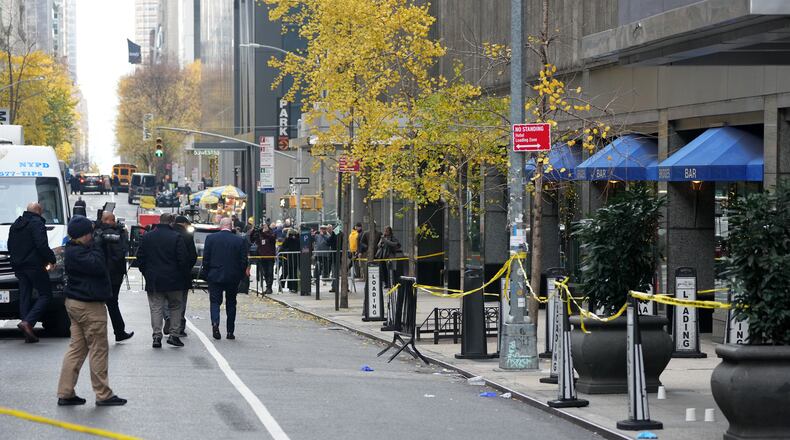The fatal shooting in Manhattan of the CEO of UnitedHealthcare has prompted increased concern about how companies handle executive protection.
Brian Thompson was shot and killed Wednesday morning as he walked to a Hilton hotel near Central Park for the health insurance company’s investor conference, prompting a multiday search for the shooter.
Authorities say evidence points to it being a targeted attack, including the words “deny,” “defend” and “depose” scrawled on ammunition found at the crime scene.
Media reports indicated that law enforcement officials believe the suspect traveled to Manhattan on a Greyhound bus that started its route in Atlanta.
Allied Universal, a global security company based in Irvine, California, is already seeing increased interest from Fortune 500 companies seeking executive protection programs, said Glen Kucera, president of Allied’s Enhanced Protection Services unit.
But many companies do not have executive protection on a regular basis, Kucera noted. Some may seek an armed presence for a CEO at certain times, such as when traveling to a city with a high crime rate, Kucera said.
Credit: TNS
Credit: TNS
Allied employs security guards at buildings and events around the world, and acquired Atlanta-based security and facility services company SecurAmerica in 2021. Kucera’s division handles executive protection for many large companies, and his employees include ex-military and ex-law enforcement officers.
Kucera has been hearing from companies seeking executive protection, as well as social media monitoring or assessments.
“The phones have been ringing off the hooks,” Kucera said. “We’re definitely seeing that a number of Fortune 500 companies, even smaller companies … would like to have protection.”
Seeking executive protection
Several major Atlanta companies declined to discuss their executive protection programs and whether the incident prompted reviews of their plans.
Major companies in Atlanta and around the country have corporate security teams.
The use of executive protection could depend on company culture and how employees may feel if they see their CEO with armed security. Some CEOs may not want executive protection, but the decision may go to a board because of the potential effect on the value of the company, he said.
And CEOs can’t avoid certain events, he said. “You have to lead from the front,” he said.
Norfolk Southern’s then-CEO Alan Shaw prompted widespread criticism after the company skipped a town-hall meeting of angry residents in East Palestine, Ohio, in February 2023 after the derailment of a train there carrying hazardous materials.
The company said at the time that “we have become increasingly concerned about the growing physical threat to our employees and members of the community around this event stemming from the increasing likelihood of the participation of outside parties.”
Social media threats
A key tool for corporate security is social media monitoring.
“We go into the dark web, where there’s other chatter that goes on,” Kucera said, to monitor for any increased risks when major decisions are made that could affect public sentiment. “Ninety-eight percent may agree with your decision, but the 2% that don’t, you know, they go on social media (and it) becomes very public.”
He said rhetoric has gotten “exponentially worse” since the COVID-19 pandemic began, “because there’s so many people that are sitting at home, so many people that are on their computers, so many people that are on social media, and it just feeds the flame.”
CEOs, like many public officials, are in the public eye. Some make decisions they believe are in the best financial interests of the company, but are not popular with workers, customers or investors.
When decisions by a company affect someone’s quality of life, “that becomes very emotional, you know, builds rage,” Kucera said. “You always have to monitor your threat. It starts with social media.”
Cedric Alexander, a former DeKalb County public safety director who is now based in Pensacola, Florida, and doing consulting work, noted there is already online vitriol against insurance companies in the wake of the attack on Thompson.
“In light of the environment that we’re in today and with so much that’s going on, I think everyone might want to step back and give some assessment of their position, how they are viewed, seen, interpreted in their communities locally and across the country,” Alexander said.
“It was a horrible, tragic event,” he said. “It can happen anywhere. Crime is always about opportunity.”
Sudden attack
The attack on Thompson, walking alone, was sudden, in a public setting on the sidewalk, starting with a gunshot to his back.
Shelton King, CEO of Executive Protection Transport in Atlanta, said the most vulnerable time for executives is the transition to and from a vehicle — or walking to a building or hotel.
Credit: TNS
Credit: TNS
He said an executive protection advance agent might scan the area for anything out of place — such as someone with a full face mask.
Kucera said for those who use protective services, an armed security guard or canine team can also serve as a deterrent.
“You want to create that appearance, that there could be repercussions if somebody tries this,” he said. “A lot of what we do is creating doubt in the mind of a potential perpetrator, and make them think twice. Sometimes, just that hesitation is what saves a life.”
But, he added, “We’ll never know” if that could have prevented the attack on Thompson.
“The world has changed. We have to change our attitudes and just learn from these incidents, to make sure we address our protocol going forward,” Kucera said.
About the Author







